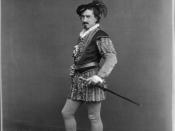Shakespeare's original text has been successfully transformed, through the deliberate choices made by the composers and directors, to demonstrate a change in values. This is evident in William Shakespeare's 17th century Othello, and Geoffrey Sax's 21st century retold transformation. Geoffrey Sax has transformed Othello due to the shift in societies values over time. There are many similarities including the themes explored, and how Iago is the man to plant the seed of doubt in Othello's mind. Despite this, Andrew Davies, the writer of Othello Retold has altered the position of women in society, and the key to Othello and Desdemona's love to show the change in values over time.
The key themes that Shakespeare explored in his Othello remain the same in Othello retold, including racism. Racism is explored through Othello being black, and an outsider to Venetian society. Consequently, many Venetians do not accept Othello as a worthy husband for Desdemona.
Iago tells Brabantio "an old black ram is tupping your white ewe" (act 1, scene 1, line 90). This is the first of many racist comments made throughout Othello. Geoffrey Sax has maintained Othello from Moorish descent, and also expanded on racism in society by shifting the war from the original play, to riots due to racism. The second scene in Othello Retold is policemen beating a black man, for no particular reason. Geoffrey Sax kept racism as a dominant theme in Othello retold because it is still a major issue in today's society. Through Geoffrey Sax's decision to have the same themes run through the Othello and Othello retold, Othello has been successfully transformed as the audience can focus on themes that are still major complications of the 21st century.
Similarly, in Shakespeare's Othello, Iago manipulates Othello, triggering his jealousy. Geoffrey Sax has maintained this...
![From the Library of Congress: TITLE: Thos. W. Keene. Othello CALL NUMBER: POS - TH - 1884 .O7, no. 1 (C size) [P&P] REPRODUCTION NUMBER: LC-USZC6-58 (color film copy transparency) RIGHTS INFORMATION: No known restrictions on publication. MEDIUM: 1 print (](https://s.writework.com/uploads/9/94760/library-congress-title-thos-w-keene-othello-call-number-pos-thumb.jpg)

